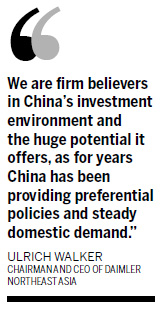Global automakers take the fast road to China market
|
Busy roads in Shanghai. Automobile sales in China are expected to maintain a steady year-on-year growth rate of 20 percent for the next five years. Zhang Heping / China Daily |
Companies can benefit from nation's favorable investment environment
BEIJING - Global automakers will continue to take the fast road to China to cash in on the huge market and growth potential and also make hay from its technological advances and favorable investment environment, said industry analysts and company executives.
"We are firm believers in China's investment environment and the huge potential it offers, as for years China has been providing preferential policies and steady domestic demand," said Ulrich Walker, chairman and chief executive officer (CEO) of Daimler Northeast Asia.
"During the global financial crisis, China continued to offer a beacon of light to other nations. As such, we hold strong confidence that China will continue to present a dynamic investment environment and a fast-growing marketplace that is favorable for foreign direct investment," said Walker.
Last year, the global automobile industry shrank considerably as demand slumped due to the financial crisis.
Buoyed by the government's stimulus measures, China became the world's biggest auto market when it surpassed the United States in terms of sales last year.

Automobile sales in China are expected to maintain a steady year-on-year growth rate of 20 percent for the next five years, according to a recent survey from AlixPartners.
Lu Xi, deputy director of Industrial Policies at the Ministry of Industry and Information Technology said China will become a major player in the global automobile industry by 2020 and also have the biggest market in terms of sales.
According to Lu, the ministry will tweak the automobile industry development policy of 2004 in such a way that it improves the international competitiveness of domestic manufacturers.
"The government will encourage domestic manufacturers to develop homegrown brands and technologies. At the same time we also hope that foreign companies can expand their investment and facilities here for a long-term existence," said Lu.
Promising market
"China is the world's most promising auto market and foreign carmakers' success in China is vital to their global performance, so who is willing to leave such a huge market?" said Zhong Shi, a Beijing-based auto analyst.
According to Walker, Daimler has continued to invest heavily in China, as demonstrated by its local joint ventures and partnerships, including Beijing Benz Automotive Co Ltd for passenger cars, Fujian Daimler Automotive Ltd for vans and Foton-Daimler for trucks. It also has a tie up with BYD-Daimler for research and development cooperation on new-energy vehicles.
"With such extensive investments, Daimler has expanded to all segments of the automotive industry in China. Looking forward, we are dedicated to further strengthening these investments in order to reinforce our competitive edge in this market, and again we feel proud to be able to develop together in a market that is as rich, dynamic, and rapidly growing as China," said Walker.
He said the German automaker and its partners have decided to invest 3 billion euros (about $3.86 billion) in China in the next few years. "We are committed to deepening our commitment to the market and maintaining excellent cooperation with our current local partners."
"There is no doubt that all the automakers will continue to invest in China," said Thomas Schiller, managing director of consulting firm Arthur D Little.
"The country is for many OEMs (original equipment manufacturers) already the most promising or most important market. The competition is fierce and the size and growth of the market will require considerable investments and increased output from companies."
Last year, the Chinese government made extensive efforts to encourage mergers and acquisitions in the domestic automobile industry, in a bid to integrate the industry and improve local automakers' competitiveness.
"We are happy to see more and more domestic companies embarking on the globalization path. Daimler is extremely pleased to take an active part in the development of the Chinese automotive industry along with these companies," said Walker.
Foreign companies should invest in product development to enrich their portfolio, create lower-priced cars and compete directly with Chinese companies. They should also look at expanding into the lesser-developed regions of China, said Schiller.
"Very few OEMs have a nationwide presence and strength. While some have dominant production and location in the south, they are weak in the north," said Schiller. "Multinational and domestic players should set up more plants in the underdeveloped regions," he said.
Global automakers are also facing challenges to keep investment balanced with market conditions and development, said Schiller.
"There will be a consolidation and nobody knows when and how the next boom will start. All OEMs should be prepared to invest heavily, but should also not allow low utilization of capacity," said Schiller.
China sold 6.31 million units of cars, multi-purpose vehicles, sports-utility vehicles and minivans in the first half, with a year-on-year growth rate of 41.3 percent, according to China Passenger Car Association.
The sales numbers are expected to decline slightly in the remaining months as the market shifts gears from overheating to healthy development. But Rao Da, secretary-general of the association, is still confident that China's total vehicle sales will reach 17.5 million units this year.
"From a long-term perspective, China's automobile market will continue its robust growth, as there is an increasing demand for smaller-sized fuel-efficient cars and huge potential in third-tier or fourth-tier cities," said Feng Fei, director of the Research Department of Industrial Economy under the Development Research Center of the State Council. "The growth engine will move from the coastal cities to inland regions, from big cities to rural regions in the future."
The demand for passenger vehicles in China will reach 25 million units in 2020 and 35 million units in 2030.
China Daily
(China Daily 09/13/2010)















